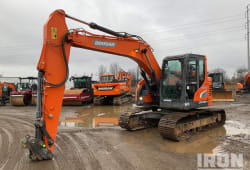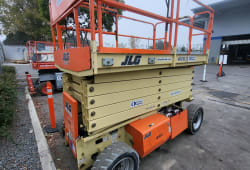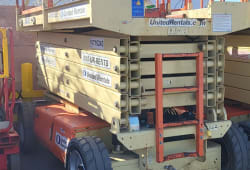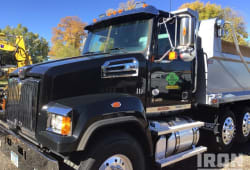The Ultimate Guide to Buying and Selling Heavy Equipment: Insider Ideas and Tricks
9 Min read
)
January 18, 2024
In the world of buying and selling heavy equipment, insider tips and tricks can play a crucial role in ensuring a successful and cost-effective transaction. Whether you are a seasoned industry professional or a newcomer looking to make a purchase or sale, understanding the nuances of this market can make a significant difference in your outcome.
The heavy machinery industry is characterized by its unique challenges and considerations, ranging from the intricacies of machine specifications to the fluctuations in market demand. Insider insights can provide invaluable guidance, helping buyers make informed decisions, and sellers optimize their offerings for maximum appeal.
One key aspect of insider knowledge involves understanding the lifecycle of heavy equipment. Knowing when to buy or sell based on market trends, technological advancements, and regulatory changes can be a game-changer. Additionally, insiders often have access to information about upcoming models, innovations, and industry shifts, allowing them to stay ahead of the curve.
Another crucial element is the understanding of pricing dynamics. Insider tips can shed light on factors that influence the valuation of heavy tools, such as depreciation rates, maintenance history, and regional market variations. Armed with this knowledge, buyers can negotiate more effectively, and sellers can set competitive yet fair prices.
In this dynamic and specialized field, insider tips and tricks serve as a guiding compass, offering a competitive edge to those who seek them out. Whether you're a buyer or seller, being well-informed about market trends, pricing strategies, and industry developments can make the difference between a successful deal and a missed opportunity in the heavy machine market.
Understanding your needs is the foundational step in the process of buying and selling heavy tools. By thoroughly assessing your project requirements and budgeting wisely, you set the stage for a successful venture.
Assessing Project Requirements
Before diving into the heavy machine market, it's crucial to define the specific needs of your projects. Every construction or industrial project is unique, and understanding the intricacies of your requirements is paramount. Consider factors such as the scale of the project, the nature of the terrain it will cover, and the functionalities your equipment must possess.
Project Scale: Take into account the size and scope of your project. Larger projects may require more robust and powerful equipment, while smaller projects might be adequately served by more compact machinery.
Terrain: Assess the geographical characteristics of the project site. Is it a flat and even surface, or does it involve challenging terrains like hills or rough landscapes? The terrain will significantly impact the type of heavy machinery you need.
Required Functionalities: Identify the specific functionalities your project demands. Different types of equipment excel in various tasks, so understanding your needs ensures that you invest in machinery that aligns with your project requirements.
Budgeting Wisely: Once you have a clear understanding of your project needs, the next step is to establish a realistic budget for heavy equipment procurement. Budgeting wisely involves more than just setting a monetary limit; it requires a comprehensive analysis of your financial capabilities and long-term implications.
Establish a Realistic Budget: Consider the overall financial scope of your project and set a budget that is both realistic and feasible. This budget should cover not only the initial purchase of equipment but also ongoing maintenance, operating costs, and potential future upgrades.
Explore Financing Options: Heavy equipment can represent a significant upfront investment. Explore various financing options to determine the most suitable arrangement for your business. This could involve loans, leasing, or other financing solutions. Evaluate the terms, interest rates, and repayment schedules to ensure they align with your financial strategy.
Evaluate Long-Term Implications: Look beyond the immediate costs and evaluate the long-term implications of your investment. Consider factors such as depreciation, resale value, and the equipment's lifespan. A well-thought-out budget should account for these aspects, ensuring that your heavy machinery investment remains financially sound throughout its operational life.
By carefully assessing project requirements and budgeting wisely, you lay a solid foundation for informed decision-making in the heavy machine market. These early steps significantly contribute to the overall success of your projects and the profitability of your equipment investments.
Researching the Market: Navigating Trends and Choices
In the ever-evolving landscape of heavy equipment, thorough research of the market is a crucial step for anyone looking to buy or sell. Staying abreast of current market trends, understanding the choices between dealerships and private sellers, and establishing strong industry connections are key aspects of this research.
Current Market Trends
Stay Updated on the Latest Trends: The heavy machinery industry is dynamic, with trends and technologies constantly evolving. Staying informed about the latest developments ensures that you make informed decisions. Follow industry publications, subscribe to newsletters, and engage with online forums to stay updated on emerging trends. Whether it's advancements in telematics, improvements in fuel efficiency, or the integration of sustainable practices, being aware of these trends can influence your purchasing or selling strategy.
Research Innovations and Advancements in Technology: Technology plays a pivotal role in the heavy equipment sector. Research the latest innovations in machinery, such as automation, GPS tracking, and augmented reality interfaces. Understanding how these technologies can enhance productivity and efficiency can guide your choices when buying or selling equipment. Additionally, technology-driven features can be attractive selling points and may influence your purchasing decisions.
Dealer vs. Private Seller: Weigh the Pros and Cons: When it comes to buying or selling heavy equipment, one must carefully consider the choice between dealerships and private sellers.
Buying from Dealerships
Pros:
Established dealers often offer a wide range of equipment options.
Access to financing options and warranties.
Potential for professional maintenance services.
Buying from Private Sellers
Pros:
Potential for lower upfront costs.
More flexibility in negotiations.
Direct communication with the equipment's previous owner.
Consider Warranties, Maintenance Services, and Resale Value: Whether dealing with a dealership or a private seller, carefully assess the warranty options, availability of maintenance services, and the potential resale value of the equipment. Warranties can provide peace of mind, while a well-documented maintenance history enhances the equipment's marketability when selling.
Networking and Industry Connections
Build a Network Within the Industry: In the heavy equipment business, connections matter. Establishing a robust network within the industry can provide valuable insights, recommendations, and potential business opportunities. Join online forums, attend local industry events, and participate in networking groups to build relationships with professionals who can offer guidance based on their experiences.
Attend Industry Events and Trade Shows: Industry events and trade shows are excellent opportunities to stay informed about the latest products, technologies, and market trends. These gatherings not only provide a platform for networking but also allow you to see equipment firsthand, engage with manufacturers, and gain a deeper understanding of the market landscape.
Thorough research of the market involves staying informed about trends, making informed choices between dealerships and private sellers, and building a strong network within the industry. These steps contribute to a well-rounded approach, ensuring that you make informed decisions when buying or selling heavy equipment.
Legal Considerations and Finalizing Payment: Safeguarding Your Heavy Equipment Transactions
When engaging in the buying or selling of heavy machines, careful attention to legal considerations and a well-structured payment process are paramount. Ensuring all legal aspects, from contracts to warranties, are thoroughly reviewed, and finalizing payment through secure methods contributes to a smooth and legally sound transaction.
Legal Considerations
Ensure Thorough Review of Contracts and Warranties: Before finalizing the heavy equipment transaction, it is crucial to review all contractual agreements and associated warranties. Contracts should clearly outline the terms and conditions of the transaction, specifying details such as equipment specifications, pricing, delivery timelines, and any included warranties. Pay close attention to any clauses related to maintenance responsibilities, indemnities, and dispute resolution mechanisms.
Seek Legal Advice if Needed: If the terms of a contract are complex or if there is uncertainty about legal implications, seeking legal advice is a prudent step. A legal professional with experience in such transactions can provide valuable insights, help interpret legal language, and ensure that the contractual agreements align with the applicable laws and regulations.
Finalizing Payment
Agree on Payment Terms and Methods: The terms of payment are a critical aspect of any heavy machinery transaction. Both buyers and sellers should agree on clear and mutually beneficial payment terms. This includes specifying the payment amount, schedule, and any relevant milestones tied to the equipment's delivery or inspection. Ensure that the payment terms are documented in the contract to avoid any misunderstandings.
Secure Financing or Make Arrangements for a Secure Transaction: Depending on the financial arrangements agreed upon, securing financing or making arrangements for a secure transaction is vital. Buyers may opt for financing through loans or leasing agreements, while sellers should confirm the payment method that suits their preferences. Common payment methods include wire transfers, certified checks, or escrow services. The use of escrow services can add an extra layer of security by ensuring that the funds are held in a neutral account until all contractual obligations are met.
Consideration for International Transactions: In the case of international transactions, currency exchange rates and compliance with export/import regulations must also be factored in. Additionally, the choice of payment method may vary based on the geographical location of the buyer and seller.
In summary, the legal considerations and finalization of payment in heavy equipment transactions require proper attention to detail. By ensuring that contracts and warranties are thoroughly reviewed and seeking legal advice if needed, you can safeguard your interests. Finalizing payment through agreed-upon terms and secure methods adds another layer of protection, contributing to a transparent and legally sound transaction for both parties involved.

Mike Kennedy is Boom & Bucket's Marketplace Operations Manager, where he leads shipping, warranties, and post-sale operations to create a seamless buyer experience. As one of the company's earliest team members, Mike helped build the foundation of Boom & Bucket's operations and guided its growth through acquisition by RB Global. He is passionate about scaling marketplaces, solving operational challenges, and improving efficiency to deliver industry-leading results.














